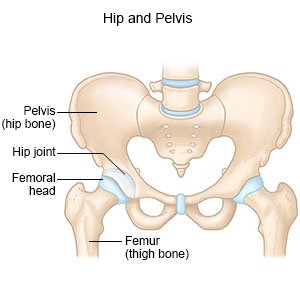Slipped Capital Femoral Epiphysis
Medically reviewed by Drugs.com. Last updated on Apr 2, 2024.
What is slipped capital femoral epiphysis?
Slipped capital femoral epiphysis (SCFE) is a hip condition that affects older children and teenagers. It occurs when the epiphysis (head) of the femur (thighbone) slips off the neck of the bone. This happens at the growth plate. The growth plate is a soft area of the bone that makes bones grow into their adult length and shape. It usually affects one side of the hip, but can affect both sides.
 |
What causes or increases the risk for SCFE?
It is not known what causes SCFE. It commonly occurs during rapid periods of growth. It may occur after a fall or sports injury. Obesity and a family history of SCFE increase your child's risk of developing SCFE. Endocrine disorders, such as hyperthyroidism, also increase your child's risk.
What are the signs and symptoms of SCFE?
- Hip stiffness
- Pain in the hip, groin, thigh, or knee
- Limping
- One leg looks shorter than the other
- One leg turns outward or inward
- Trouble putting weight on the side of the affected hip
How is SCFE diagnosed?
The healthcare provider will ask about your child's symptoms. He or she will also ask if your child has any medical conditions. The provider will examine your child's affected hip and leg. He or she will also observe the way your child walks. X-rays or CT scans of your child's pelvis, hip, and thigh may show the SCFE. Your child may be given contrast liquid to help his or her hip bones show up better in the pictures. Tell the healthcare provider if your child has ever had an allergic reaction to contrast liquid.
How is SCFE treated?
The goal of treatment is to keep the femur from slipping more. This will help to prevent future health problems, such as arthritis. Surgery will be done to insert 1 or 2 metal screws through the growth plate. This will help to keep the head of the femur from moving out of place.
When should I call my child's healthcare provider?
- Your child has severe pain.
- Your child cannot move his or her leg.
- You have questions or concerns about your child's condition or care.
Care Agreement
You have the right to help plan your child's care. Learn about your child's health condition and how it may be treated. Discuss treatment options with your child's healthcare providers to decide what care you want for your child. The above information is an educational aid only. It is not intended as medical advice for individual conditions or treatments. Talk to your doctor, nurse or pharmacist before following any medical regimen to see if it is safe and effective for you.© Copyright Merative 2024 Information is for End User's use only and may not be sold, redistributed or otherwise used for commercial purposes.
Further information
Always consult your healthcare provider to ensure the information displayed on this page applies to your personal circumstances.
